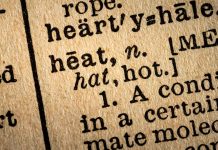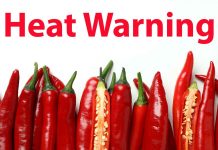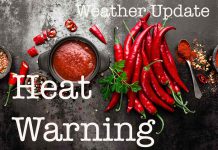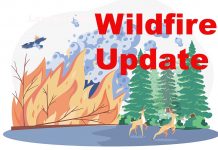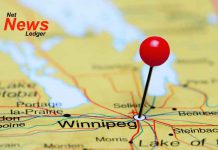Smoke Advisory: High Levels of Air Pollution
Due to smoke from forest fires in Quebec and northeastern Ontario, high levels of air pollution have been observed, leading to deteriorated air quality in the affected area. However, conditions are expected to improve tonight into Tuesday.
Fluctuating Air Quality and Visibility
Air quality and visibility can vary significantly due to the presence of wildfire smoke. These conditions can fluctuate over short distances and change from hour to hour.
Detailed Information
For more detailed information, please refer to the website: www.canada.ca/en/environment-climate-change/services/air-quality-health-index/wildfire-smoke.html.
Health Risks of Wildfire Smoke
Even at low concentrations, wildfire smoke can be harmful to everyone’s health. It is important for everyone to take action to reduce their exposure to wildfire smoke.
Higher Risk for Vulnerable Populations
Individuals with lung disease (such as asthma) or heart disease, older adults, children, pregnant individuals, and people who work outdoors are at a higher risk of experiencing health effects caused by wildfire smoke. Speak with your healthcare provider to develop a management plan for wildfire smoke events. Ensure you have an adequate supply of necessary medications at home and carry them with you during wildfire season.
Adjusting Activity Level and Seeking Medical Advice
If breathing becomes uncomfortable or if you or someone in your care feel unwell, it is recommended to stop or reduce your activity level. Contact your healthcare provider or local health authority if you develop severe symptoms or need advice.
Monitoring Air Quality Health Index (AQHI) and Symptoms
Check the Air Quality Health Index (AQHI) and monitor your symptoms. People react differently to smoke, but mild irritation and discomfort are common and typically subside when the smoke clears. Drinking plenty of water can help your body cope with the smoke.
Indoor Air Quality Measures
If you have an HVAC system in your home, use the highest-rated MERV filter for your system (ideally rated 13 or higher) and set the fan to recirculate air constantly. Consider using a portable High Efficiency Particulate Air (HEPA) air cleaner. Keep your doors and windows closed if the temperature inside your home is comfortable.
Seeking Clean Air Locations
Take a break from the smoke by finding locations in your community with clean, cool air.
Respirator Masks for Outdoor Activities
If you need to spend time outdoors, wearing a well-fitted respirator-type mask, such as a NIOSH certified N95 or equivalent respirator, can help reduce your exposure to fine particles in smoke. These fine particles pose the greatest health risk. However, respirators do not provide protection against gases in wildfire smoke. Listen to your body and reduce or stop activities if you experience symptoms.
Supporting Vulnerable Individuals
Regularly check on people in your care and those around you who may be more susceptible to the effects of smoke.
Reducing Indoor Air Pollution
Reduce sources of indoor air pollution by avoiding smoking or vaping indoors, burning incense and candles, frying foods, using wood stoves, and minimizing vacuuming. During a pollution episode, remove dust on indoor surfaces by wiping and wet mopping.
Mental Health Awareness
If you experience feelings of stress, anxiety, or depression, reach out to your mental health care provider for advice or visit: https://www.wellnesstogether.ca/en-CA.
Air Quality Information
Visit www.airhealth.ca for information on reducing your health risk and your personal contribution to pollution levels. The website also provides current and forecasted Air Quality Health Index (AQHI) values.


